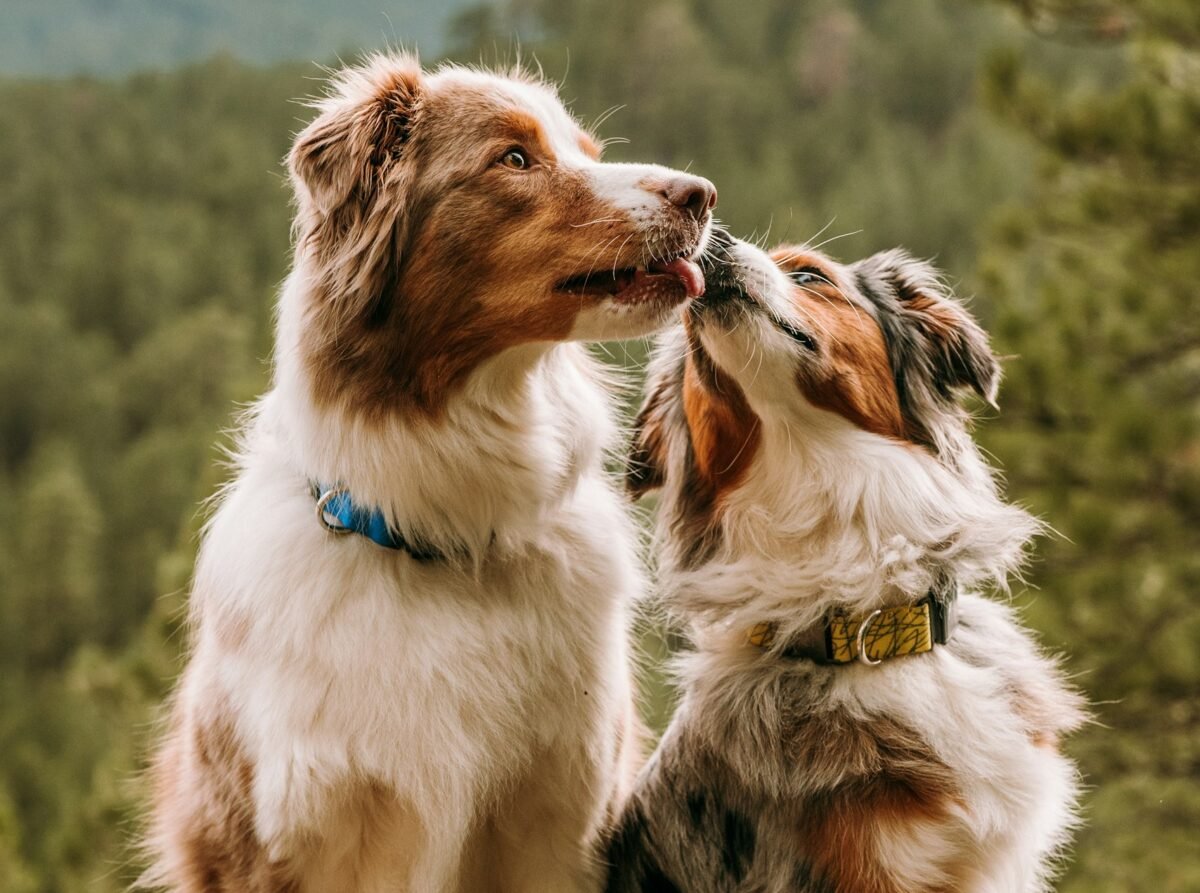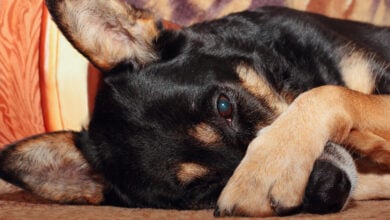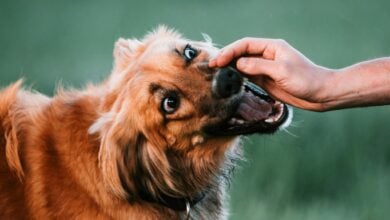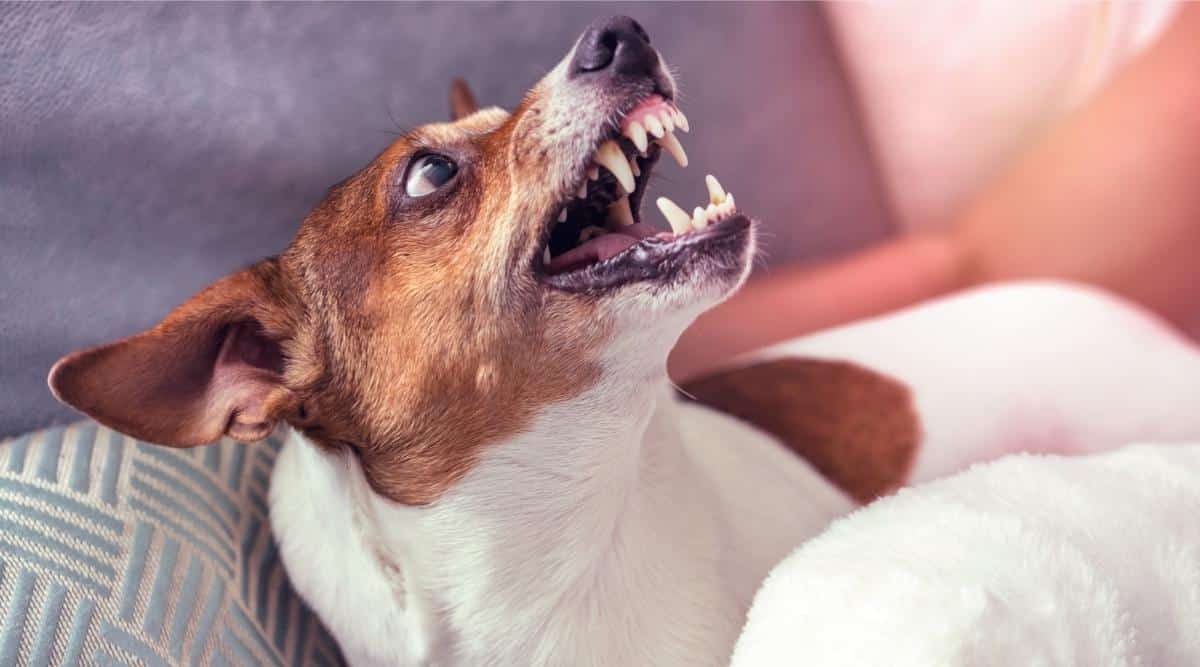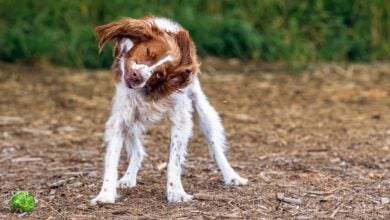Why Is My Dog Obsessed With Licking Other Dogs’ Mouths?
When you purchase through links on our site, we may earn a commission. Here’s how it works.
If you’ve ever taken your pup to the dog park, you’ve probably seen it: two dogs sniff hello, then one dives in with a sloppy lick to the other’s mouth. Cue the awkward human laughs and a few “ew, gross!” comments.
Table of Contents
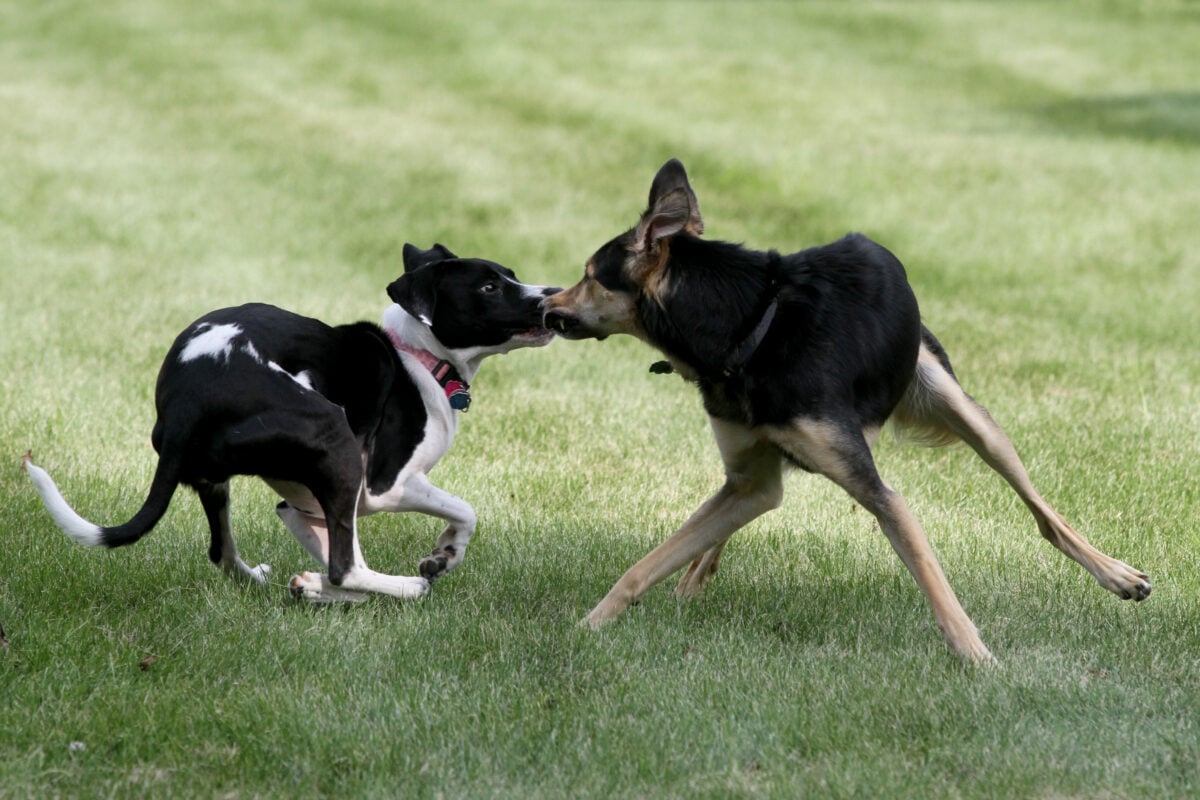
But this isn’t doggy PDA gone wrong. Mouth licking is one of the oldest, most versatile forms of canine communication — part instinct, part affection, and sometimes just about what the other dog had for lunch.
So why do dogs lick each other’s mouths? Read on to find the multiple reasons.
Adorable Or Appalling?
First, here’s a primer test. Some dog parents melt when they see pups licking each other’s mouths, others cringe and reach for the hand sanitizer. Is it sweet affection or just plain gross? Watch these quick clips and decide for yourself.
Why Do Dogs Lick Each Other’s Mouths? 8 Main Reasons
It may look odd (or a little gross), but dogs don’t hand out slobbery mouth licks at random. This ritual is part instinct, part communication, and part “I smell snacks.” From puppy survival strategies to canine diplomacy, here are the top eight reasons why dogs lick each other in the mouth and what it really means.
1. A Doggy Handshake: Greeting Rituals
For us, greetings are handshakes, hugs, or maybe an awkward wave. When dogs meet, their first impression isn’t a handshake or small talk — it’s often a quick nose-to-mouth investigation. And sometimes, it’s followed up with a lick.
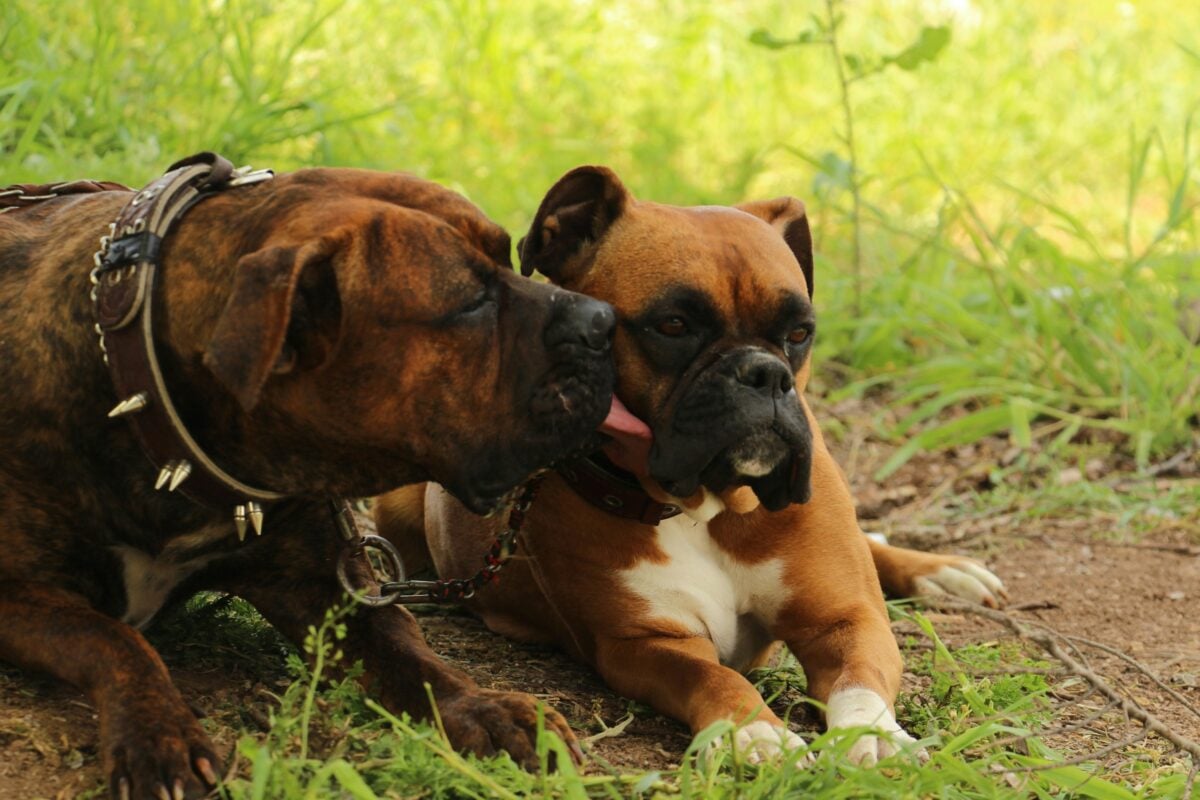
Why? Mouth licking serves as a social greeting ritual. Unlike handshakes, licking can communicate both respect and affection in the same motion.
- Appeasement signal: One dog may lick another’s mouth to say, “I’m not a threat.”
- Social smoothing: Just as humans use smiles to ease tension, dogs use licks to keep encounters friendly.
- Pack dynamics: Licking helps establish order, showing respect to a dog with higher confidence.
Patricia McConnell, Ph.D., a renowned animal behaviorist, calls these “appeasement gestures” — instinctive moves dogs use to prevent fights before they start. Instead of growling or posturing, they lick.
Think of it this way: while we exchange polite hellos, dogs exchange slobber. Sure, it’s messy, but it works.
Quick Fact: In multi-dog households, you’ll often see one dog greet another with a lick when they’ve been apart, even for just a short time. It’s their version of a “welcome back!” hug.
2. Puppyhood Instincts
The roots of this behavior go all the way back to puppyhood. In the wild, wolf and coyote pups lick their mothers’ mouths to trigger regurgitation of food. Without that ritual, dinner doesn’t arrive.
- Survival mechanism: Puppies depend on licking to signal hunger.
- Hardwired behavior: Even though kibble and canned food replaced regurgitated prey, the instinct persists.
- Evolutionary continuity: From wolves to domestic dogs, the gesture carries on.
Wolf pups instinctively lick adult muzzles to trigger regurgitation — a behavior documented repeatedly in ethology studies. Domestic dogs have inherited this ancient survival signal, even though kibble has replaced regurgitated prey.
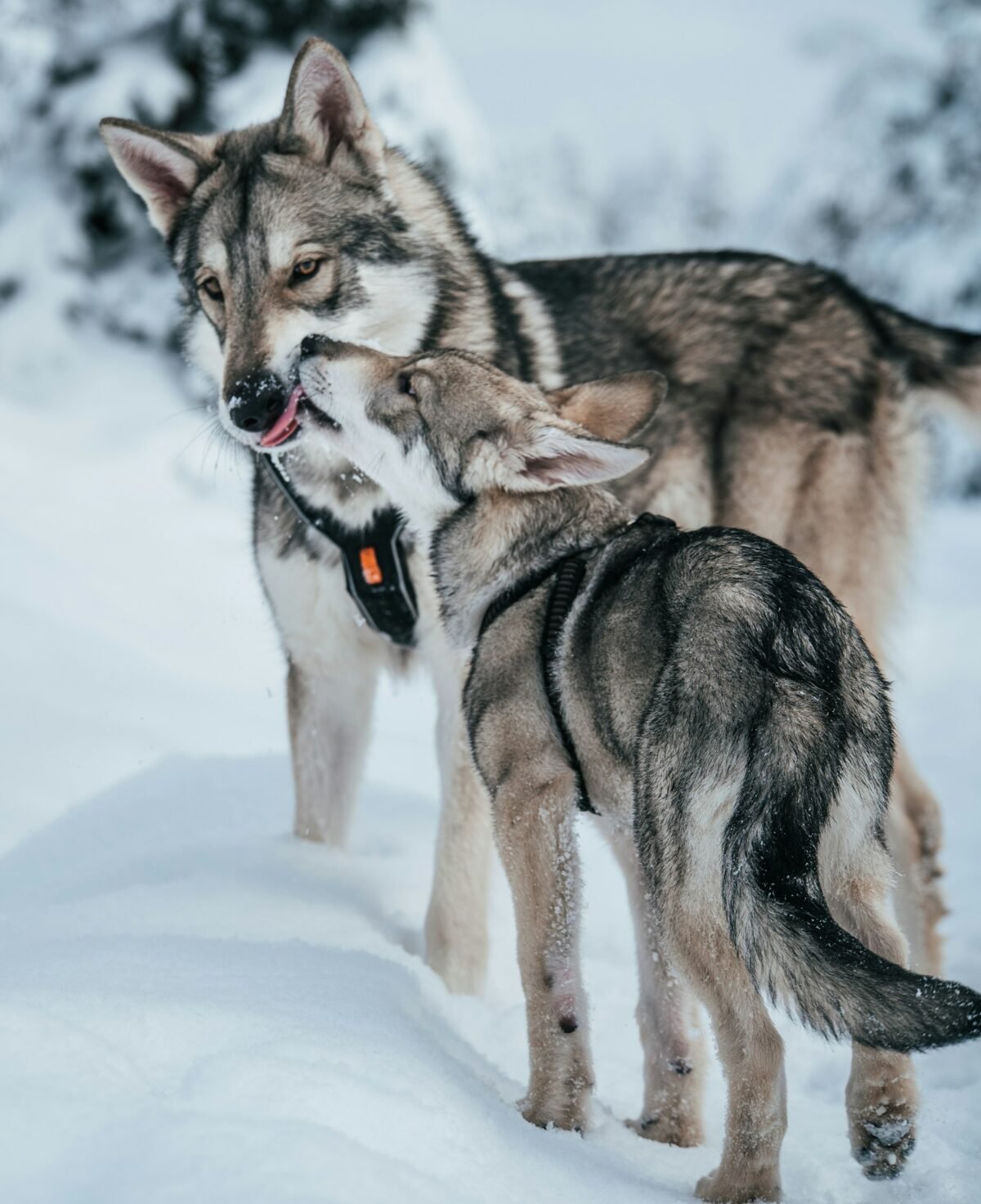
So when you see your grown dog licking another’s mouth, part of the behavior is simply an echo of ancient puppy survival tactics.
Quick Fact: This is why puppies often lick older dogs more frequently than adults lick each other — it’s a behavior that fades as they grow but never disappears entirely.
3. Love Licks: Affection & Bonding
Dogs are social animals, and rituals help maintain strong group ties. Just as primates groom each other or cats lick each other’s fur, dogs use mouth licking to bond and show affection.
- Hormone boost: Affectionate licking triggers oxytocin (the “love hormone”) in both the licker and the receiver.
- Stress relief: A 2021 study in Animal Behaviour found affiliative behaviors like licking lower stress levels in pack animals.
- Comfort: Dogs may lick each other’s mouths after stressful events to reassure each other.
So when your pup gently licks a closely bonded canine friend’s muzzle, it’s their way of saying, “I care about you.”
4. “Yes, Boss”: Mouth Licking As Canine Respect
Dogs are pack animals, and like all pack structures, someone’s in charge. One way lower-ranking dogs show respect is through mouth licking.
- Acknowledging hierarchy: A lick often means, “You’re the boss.”
- Conflict prevention: Submissive dogs use licking to prevent aggression from higher-ranking dogs.
- Household hierarchy: If one of your dogs always licks and the other just accepts it, you’ve spotted the alpha of your living room.
Quick Takeaway: Licking doesn’t make one dog “weak” — it just means they’re smart enough to avoid conflict by showing respect.
5. Canine Diplomacy: Communication Signals
Mouth licking is also part of a dog’s non-verbal communication toolkit.
- Tension diffuser: A nervous dog may lick another’s mouth to de-escalate conflict.
- Friendly message: Licking communicates, “I’m not here to fight.”
- Part of calming signals: Along with yawns, turning away, and slow blinking, it’s a subtle signal of peace.
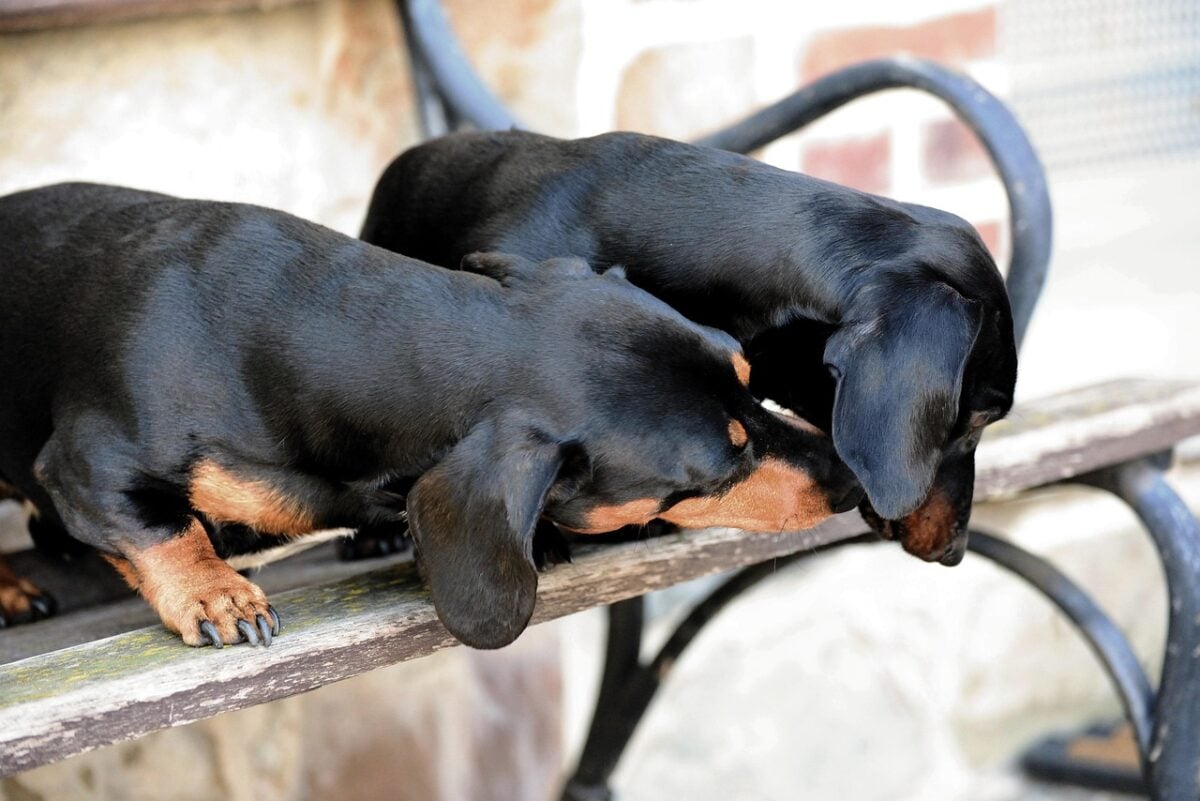
Turid Rugaas, canine behaviorist and author of On Talking Terms With Dogs: Calming Signals, highlights licking as one of the most important appeasement gestures in dog body language.
So the next time you spot one dog licking another’s mouth at the dog park, it may be less about food and more about politics: canine diplomacy in action.
6. Leftovers, Please: The Taste Factor
Let’s be real. Sometimes it’s not that deep. Sometimes licking is just about leftover flavors.
- Food residue: Dogs love sampling another dog’s recent meal.
- Curiosity-driven: A lick tells them what the other dog just ate.
- Gross but real: Even unappetizing smells (to us) are fascinating to dogs.
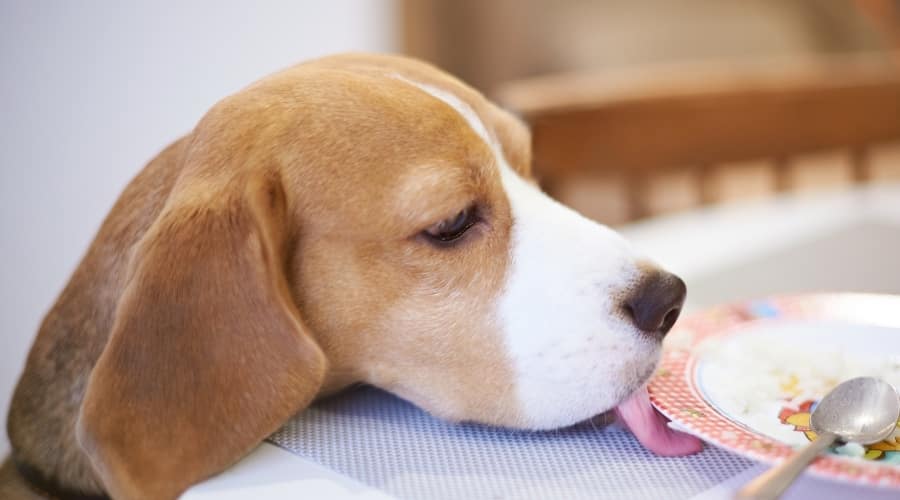
If your dog just licked peanut butter off a spoon, don’t be surprised if their buddy comes over for a taste test. To your dog, your breath after dinner is basically an open invitation: “Free samples available here.”
7. Built-In Vet Check: Health Detection
Here’s a fascinating twist: dogs might lick each other’s mouths to detect illness.
Research shows that dogs can smell certain diseases in humans, from cancer to diabetes, with remarkable accuracy. So it’s not a stretch to think they can detect changes in another dog’s health, too.
Dogs’ noses and tongues aren’t just about snacks — they may also act as health detectors.
- Illness cues: Dogs can smell chemical changes linked to disease.
- Dogs are trained to detect over a dozen human diseases.
- Peer health check: When one dog persistently licks another’s mouth, it could be detecting dental problems, infection, or just “off” smells.
So, yes — it’s possible that mouth licking doubles as a medical checkup. Dogs may sense what we can’t.
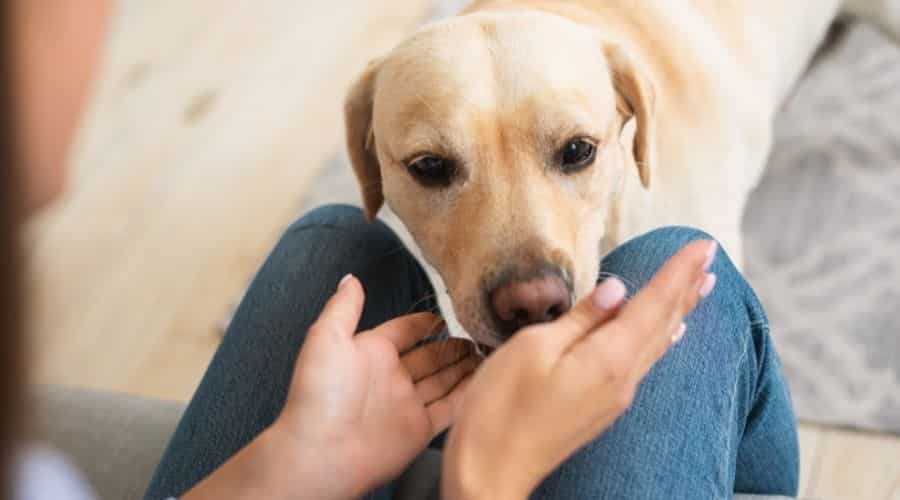
Vet Tip: If your dog suddenly starts obsessively licking another’s mouth, it might be worth a vet visit to rule out hidden problems.
8. Grooming Rituals
Sometimes, licking is just about staying clean. Dogs groom each other with tongue baths, and that includes the face and mouth area.
- Hygiene: Helps remove leftover food or dirt.
- Bonding: Grooming strengthens social connections.
- Comfort: Dogs often relax when another tends to them.
This is most common in dogs that live together and already share a strong bond. Grooming through mouth licking is less about hierarchy and more about mutual care. Mouth licking isn’t just about communication; it can also be part of mutual grooming. Dogs use similar behavior when licking each other’s ears to help clean hard-to-reach areas and strengthen their social bonds.
Quick Fact: Wolves and wild canids also practice mutual grooming — licking helps maintain both hygiene and harmony in the pack.
To Interrupt, Or Not To Interrupt?
So, should you let your dog lick other dogs’ mouths? It depends.
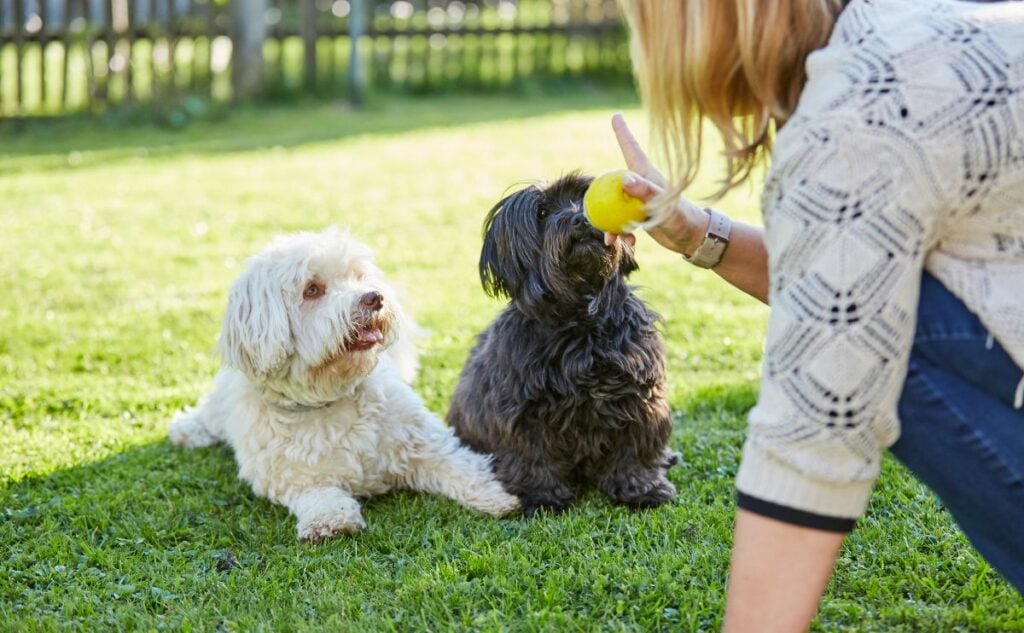
- Harmless licking: Brief, gentle, occasional → fine.
- Concerning licking: Excessive, pushy, or causing tension → redirect.
- Health concerns: Generally safe, but avoid if one dog has infections, sores, or contagious illness.
Pro tip: If you’d rather not deal with the drool, redirect with a toy, interactive puzzle, or training command.
Is It Safe For Dogs To Lick Each Other’s Mouths?
This is one of the most common questions dog parents ask once they get past the “ew” factor. The short answer: usually, yes, but there are exceptions.
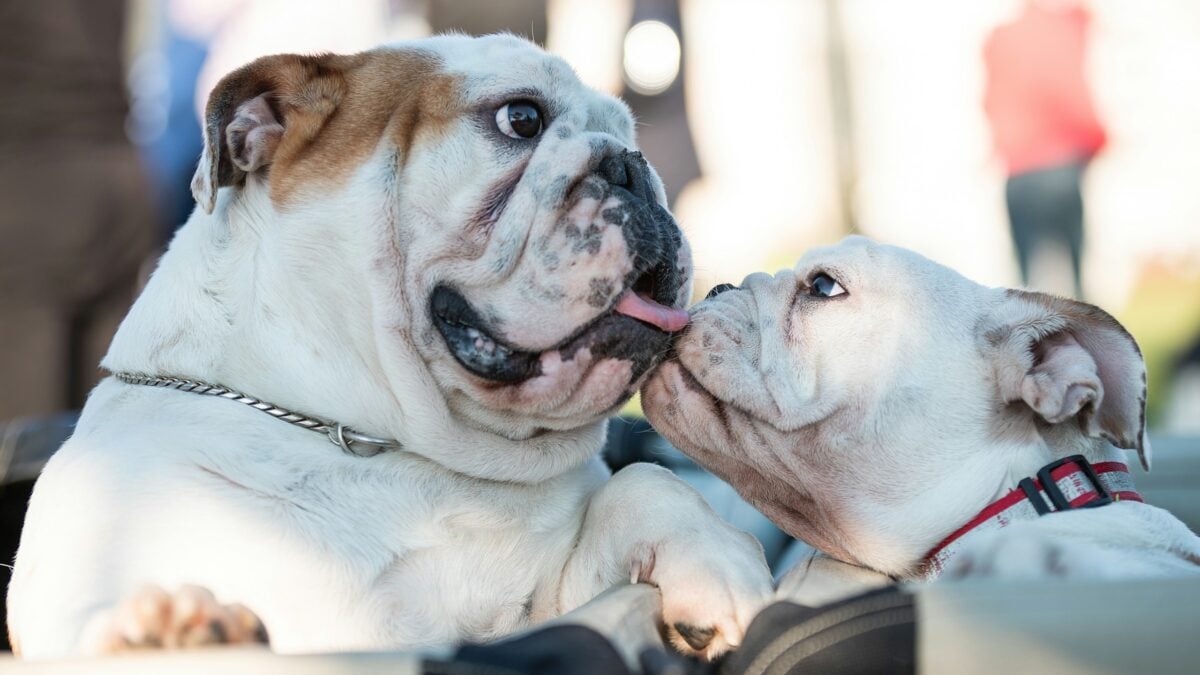
- Normal bacteria exchange: Healthy dogs have strong immune systems and can tolerate the harmless bacteria that swap during licking.
- Risks during illness: If one dog has kennel cough, a mouth wound, or a contagious infection, licking can spread it.
- Dental disease factor: If a dog has periodontal disease, mouth licking may transfer bacteria that irritate the gums.
Research has found that dog saliva can carry zoonotic bacteria — meaning they can spread to other dogs and even humans. The risk isn’t high in healthy animals, but it’s real.
Bottom line: brief, casual mouth licks are safe between healthy dogs. But if your dog is recovering from illness, has bad dental disease, or is showing signs of infection, it’s better to curb the behavior until they’re healthy.
When To Worry: Red Flags For Dog Parents
Most of the time, a little mouth licking is just dogs being dogs. But sometimes, what starts out as a quirky greeting or bonding ritual can tip into something less cute. Here are the red flags to watch for if you’re wondering when this behavior crosses the line.
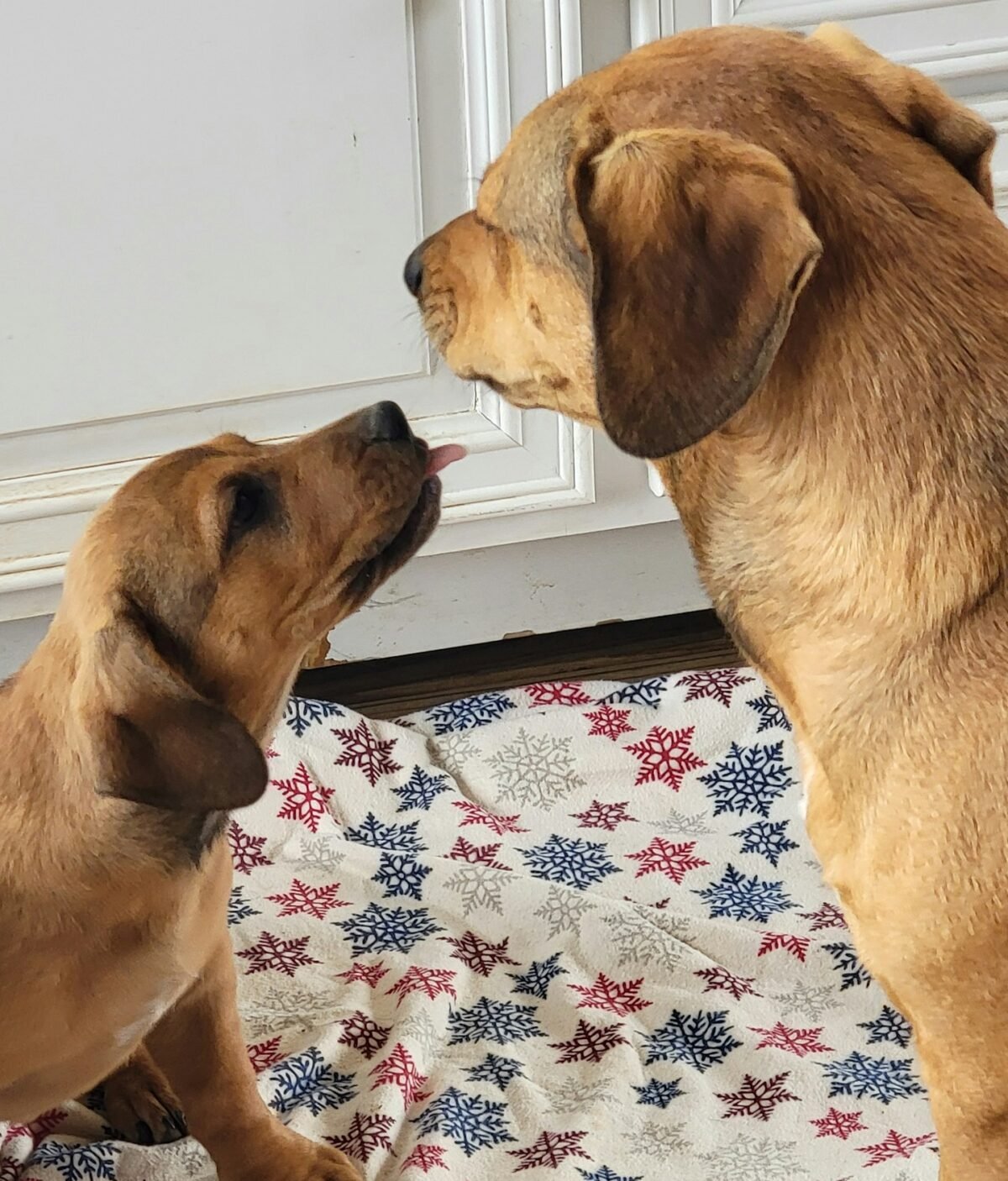
1. It’s Constant Or Obsessive
If your dog tries to lick every other dog’s mouth on repeat — or won’t stop licking the same companion — that’s not normal social etiquette. Obsessive licking can signal anxiety, compulsive behavior, or an underlying medical issue.
2. The Other Dog Isn’t Into It
Dogs are usually polite, but if one dog keeps turning away, growling, or snapping while the other persists, you’ve got a social mismatch. Allowing it to continue could create tension or even fights.
3. It Interferes With Play
Mouth licking should be brief. If it takes over playtime, prevents normal interaction, or seems like a fixation, that’s your cue to step in.
4. It’s Paired With Signs Of Nausea Or Discomfort
Repetitive licking, especially if your dog is also drooling, smacking lips, or gulping, can signal nausea or GI upset. In some cases, it may also point to dental disease or oral pain.
5. It Looks More Like Stress Than Bonding
Dogs sometimes lick compulsively, the way humans chew their nails or tap their feet. This can be a coping mechanism for stress, boredom, or an unsettled environment.
Vet Tip: Occasional mouth licking is normal and healthy. But if it becomes relentless or causes friction between dogs, it’s time to check with your vet or a certified behavioral animal trainer. You want to rule out health issues before chalking it up to “quirkiness.”
Why Dogs Lick Human Mouths (And Whether You Should Let Them)
If you’ve ever woken up to your dog planting a slobbery kiss right on your lips, you already know this behavior isn’t reserved for dogs alone.
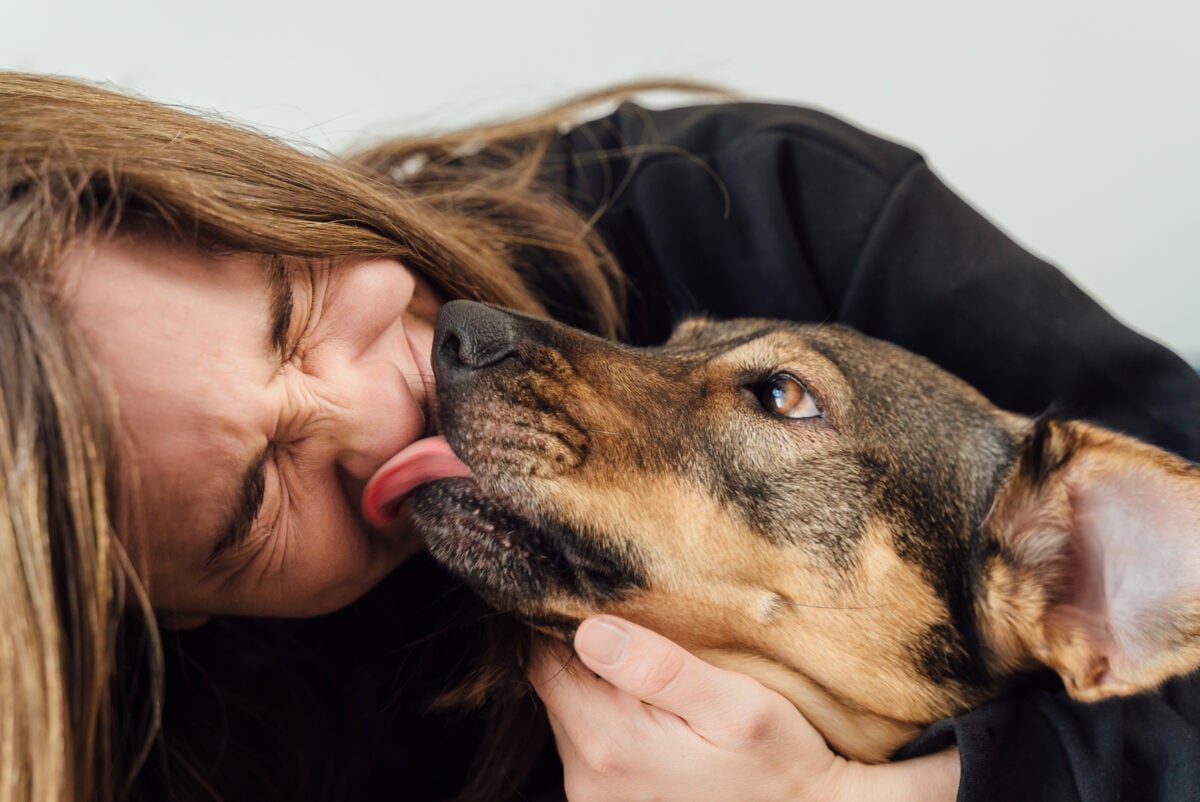
Dogs lick human mouths for many of the same reasons they lick each other’s:
- Affection and bonding: You’re their pack, and they love you.
- Submission: Dogs may lick your face to acknowledge your leadership.
- Taste: That post-pizza breath? Delicious.
- Information gathering: Our saliva carries scents and chemical markers that dogs can interpret.
While it feels like unconditional love, vets do caution against letting dogs lick directly into your mouth because zoonotic bacteria can transfer through saliva. In rare cases, these can cause infections in people.
Cultural & Historical Perspective
Mouth licking isn’t just a domestic dog behavior. It’s deeply rooted in canine history and other animal species, as well.
- Wolves and coyotes: Pups lick adult muzzles to trigger regurgitation. Adults may also lick each other’s faces as part of bonding and pack cooperation.
- Foxes: Ethologists have documented similar behaviors in foxes, reinforcing the evolutionary continuity of this gesture.
- Dingoes and wild dogs: Observed using mouth licking both as a feeding signal and as a way to manage social dynamics.
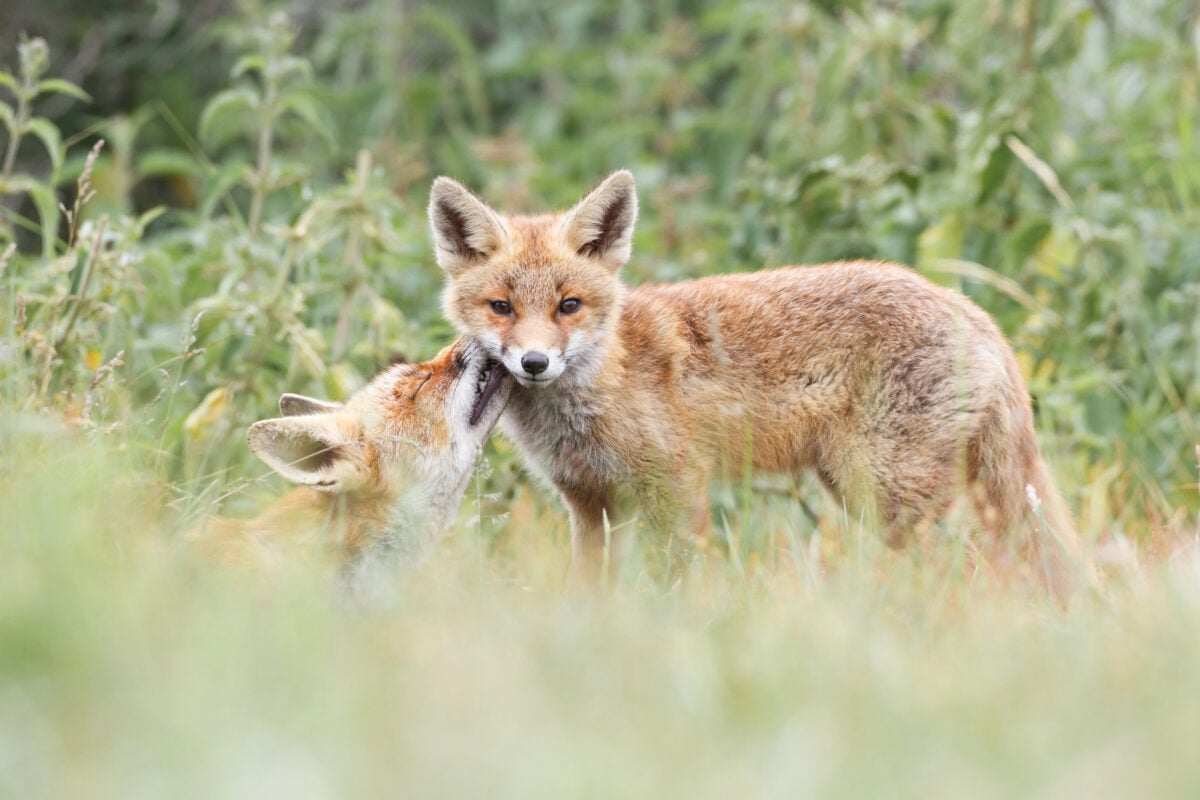
These parallels suggest that when we ask why do dogs lick each other’s mouths, the answer isn’t modern at all — it’s ancient. It’s a behavior that helped wild canids survive and thrive as cooperative hunters.
So the next time you catch your Lab or your Dachshund licking a buddy’s mouth, remember: they’re tapping into a behavior older than civilization itself.
Frequently Asked Questions
Still wondering what’s behind all that slobber? You’re not alone. Dog parents ask these same questions all the time, usually after an awkward dog park encounter or a surprise wake-up “kiss.” If you don’t see yours here, ask us in our comments.
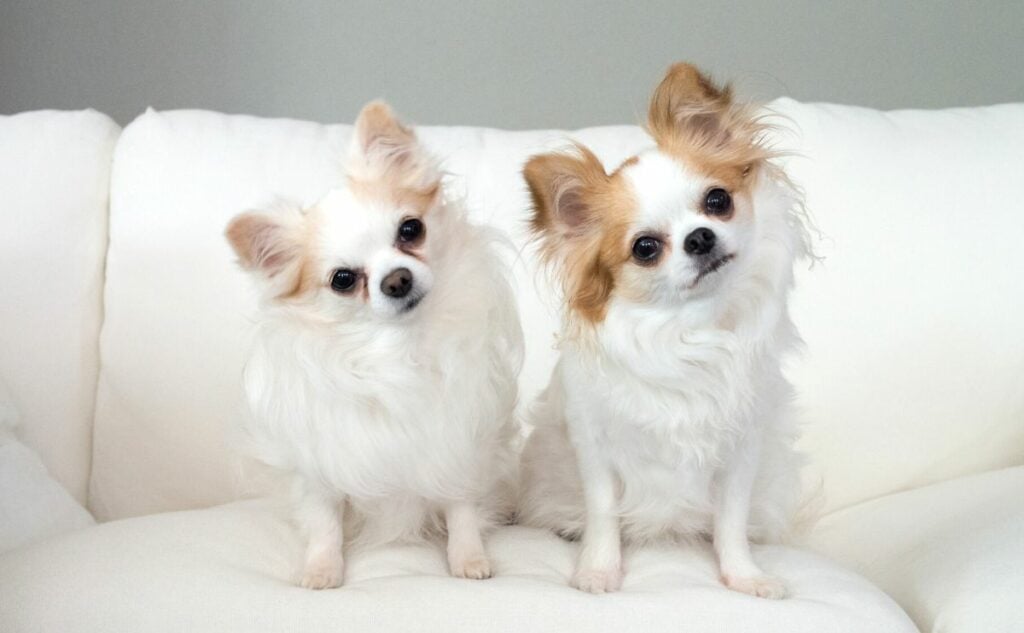
Why Do Dogs Lick Each Other’s Mouths After Eating?
This is one of the most common times you’ll notice it. Dogs lick each other’s mouths after meals because food smells linger. A dog’s sense of smell is so powerful that even tiny traces of kibble, meat, or peanut butter are detectable on another dog’s breath.
There’s also an instinctual angle. In the wild, pups lick adult muzzles after hunting trips to trigger regurgitation of food. Domestic dogs don’t rely on that anymore, but the instinct lingers.
If your pup licks another dog right after eating, it’s usually more about curiosity than affection. It doesn’t mean they’re hungry or underfed — they’re just checking out what the other dog had for dinner.
Do Dogs Lick Each Other’s Mouths To Show Dominance?
Actually, it’s usually the opposite. Most mouth licking is a submissive gesture. When one dog licks and the other simply accepts it, the licker is acknowledging the other’s higher status.
That said, dominance and submission in domestic dogs aren’t as rigid as they are in wild packs. Sometimes, dogs lick each other out of affection or habit, not hierarchy. The key is to look at the bigger body language picture: is the licking dog lowering its head, avoiding eye contact, or rolling slightly onto its side? That signals submission.
So while dominance plays a role, mouth licking is more about respect and appeasement than bossiness.
Is It Safe For Dogs To Lick Each Other In The Mouth?
In most cases, yes. Healthy dogs licking each other’s mouths is harmless. But there are exceptions worth noting:
- If one dog is sick (kennel cough, upper respiratory infection, parasites), mouth licking can spread illness.
- If there are mouth wounds, bacteria can pass from one dog to another.
- If one has severe dental disease, licking may transfer bacteria that worsen oral health.
Bottom line: safe between healthy, vaccinated dogs, but better avoided when illness or infection is involved.
Why Does My Dog Lick My Puppy’s Mouth All The Time?
Adult dogs often lick puppies’ mouths for two reasons:
- Affection and bonding: Puppies are vulnerable, and adults often comfort them with gentle licks.
- Instinct: In the wild, this licking would encourage mom to regurgitate food for pups.
Puppies may also lick adult mouths even more frequently, carrying that same evolutionary signal: “Feed me, protect me.”
If your adult dog is licking your puppy a lot, it’s usually a good sign of acceptance and bonding. But keep an eye out. If it turns into constant licking, it could tip into anxiety or overprotection.
Why Do Some Dogs Lick More Than Others?
Just like people, dogs have individual personalities. Some are natural lickers, while others rarely dish out slobbery kisses. A few factors influence this:
- Breed tendencies: Social, affectionate breeds (like Retrievers or Spaniels) often lick more than independent breeds (like Basenjis).
- Early experiences: Puppies raised in close contact with their littermates may lick more as adults.
- Stress levels: Anxious or high-energy dogs may lick as a coping mechanism.
There’s also a genetic angle — in wolves, some individuals lick packmates far more often than others, suggesting innate differences.
So if your dog licks constantly while your neighbor’s barely licks at all, don’t worry. It’s usually a mix of instinct, personality, and context.
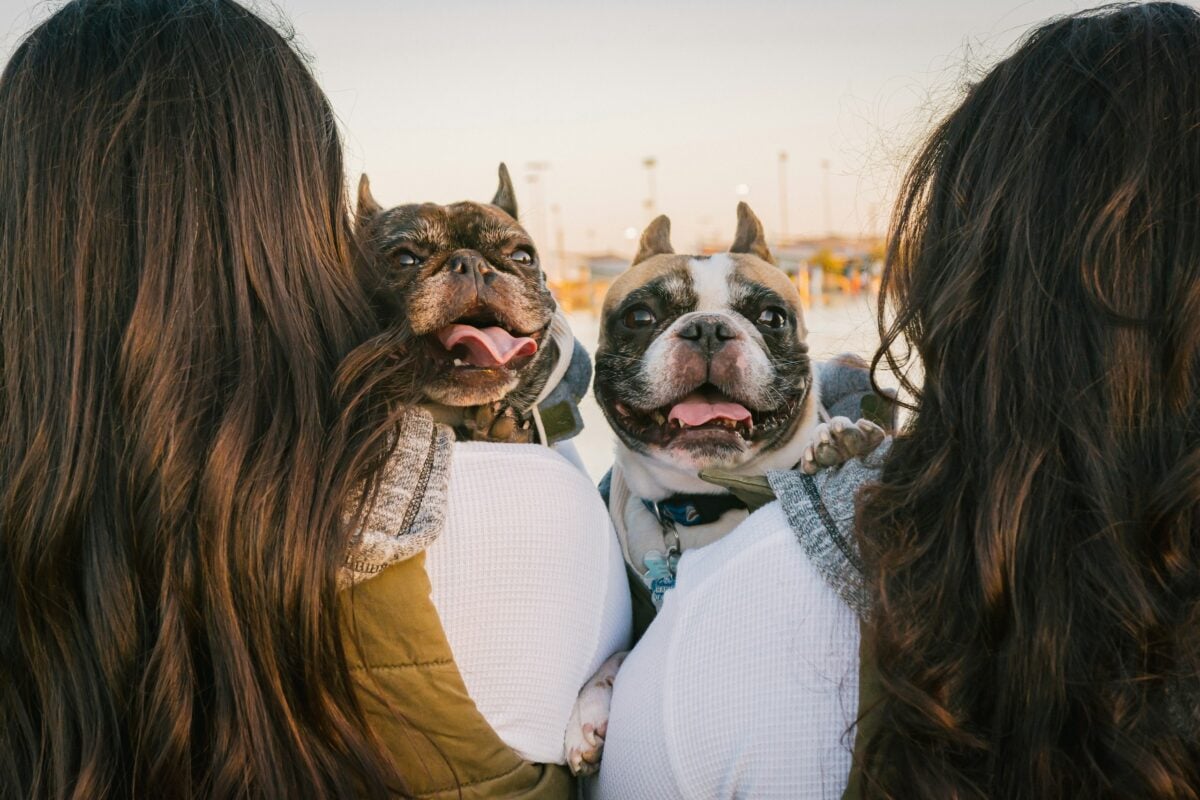
Final Thoughts: Drool Happens
Dog mouth licking might gross us out, but for dogs it’s an ancient, instinctive, and deeply social ritual. Most of the time, it’s harmless — and sometimes it’s even useful.
And if you really want to understand your pup better, check out our guides on dog body language, how dogs communicate with each other, and why dogs sniff everything. The more you learn, the less those soggy greetings will surprise you.
What about your pup? Have you caught them in a slobbery mouth-lick moment? Share your story in the comments — we’d love to hear it!
